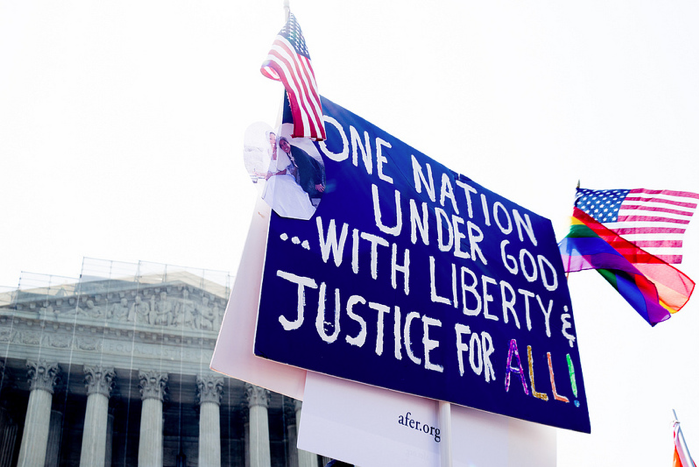What does the Supreme Court's marriage equality ruling mean for the South?

In this week's decision striking down the Defense of Marriage Act (DOMA), the U.S. Supreme Court held that it was unconstitutional for the federal government to recognize some marriages but not others.
That means that in the 12 states that legally recognize same-sex marriages -- California, Connecticut, Iowa, Maine, Maryland, Massachusetts, Minnesota, New Hampshire, New York, Rhode Island, Vermont, and Washington -- legally married gay couples will be entitled to the more than 1,100 benefits that the federal government bestows on legally married straight couples. They include filing taxes jointly, receiving Social Security survivor benefits, having access to veterans' spousal benefits, and sponsoring a foreign spouse for U.S. residency.
But for same-sex couples who are legally married but live in a state that does not recognize marriage equality -- including all of the states in the South -- the situation is more complicated, as the New York Times reports:
Consider two women living at Keesler Air Force Base in Biloxi, Miss., who travel to Maine to get married. When they get back to the base, the military will now recognize their marriage, affording them a variety of benefits that would go to any married couple, like health care and a housing allowance.
But once they exit Keesler's gates, they will find their marriage license means nothing to the state of Mississippi, where same-sex couples cannot adopt children and employers can fire someone who is gay.
"For married couples living in states without marriage equality, there is less clarity," according to the Human Rights Campaign (HRC), an LGBT advocacy group. "Even with DOMA out of the way, different federal programs have different rules that determine where an agency looks to decide if a marriage is valid -- either place of celebration or place of residence."
HRC notes that the Obama administration has the power to change many of the conflicting rules and regulations. And just hours after the Supreme Court announced its DOMA decision, federal lawmakers in both the House and Senate reintroduced the Respect for Marriage Act to fully remove DOMA from the books. The measures have bipartisan support, including that of Rep. Ileana Ros-Lehtinen (R-Fla.).
But as HRC points out, there is much work ahead before same-sex couples nationwide can enjoy the same protections as their straight counterparts.
In some states in the South, though, that work is already underway.
In Arkansas, for example, LGBT activists are currently organizing to get a marriage equality amendment to the state constitution on the ballot in 2016. Arkansas voters approved an amendment banning same-sex marriage in 2004 with an overwhelming 75 percent of the vote.
The Arkansas Initiative for Marriage Equality's Trey Weir told The Maddow Blog that activists started meeting after the 2012 elections, when voters in Maine, Maryland and Washington approved marriage equality:
We have hopes that the snowball effect of LGBT rights will find its way to Arkansas and the rest of the south in the near future. Our success rate is not seeing it get passed but also educating Arkansans on the issue. . . . We hope that our efforts will put marriage equality and other LGBT issues on the fast track in the right direction here in Arkansas.
In Florida, a new political action committee -- Equal Marriage Florida -- filed paperwork this month to begin the processing of placing same-gender civil marriage on the 2014 state ballot and repealing the current constitutional ban, Marriage Equality USA reports.
Organizing for marriage equality is also underway in Texas, where resolutions to repeal the constitutional ban on same-sex marriage were filed for the first time ever in the state House and Senate during the recent legislative session.
A recent Equality Texas Foundation poll found that public opinion on marriage in the state has shifted significantly, with voters now favoring marriage equality by 47.9 percent to 47.5 percent. That represents a 24 percent jump in support for marriage equality since 2005, when Texas voters adopted a constitutional amendment banning same-sex marriage.
"From the Rocky Mountains to the heart of the South, it's time to push equality forward until every American can marry the person they love and all LGBT people are guaranteed equal protection under the law," said HRC President Chad Griffin.
Tags
Sue Sturgis
Sue is the former editorial director of Facing South and the Institute for Southern Studies.
